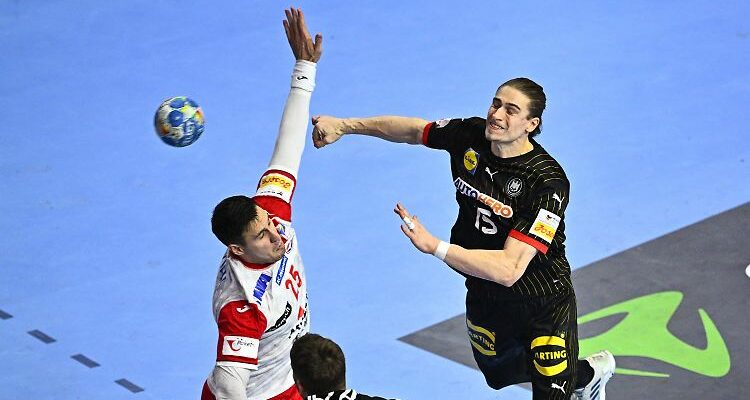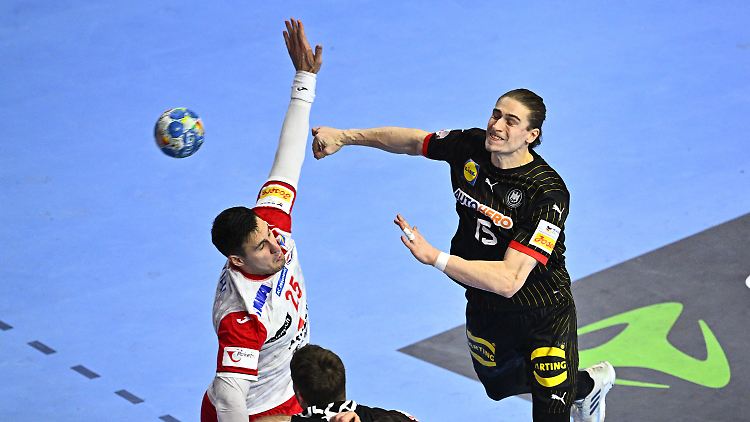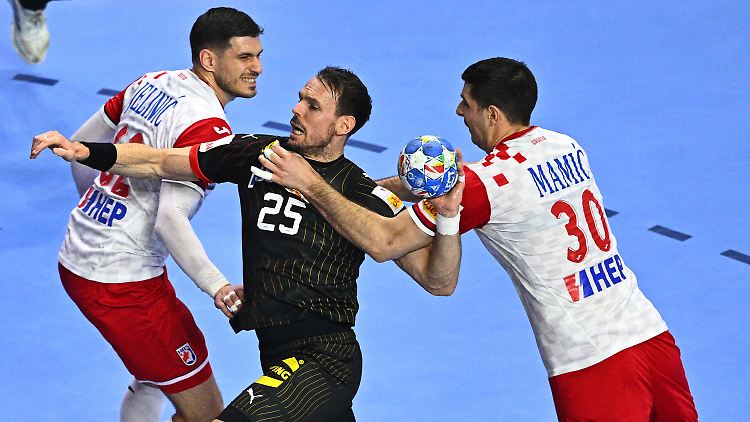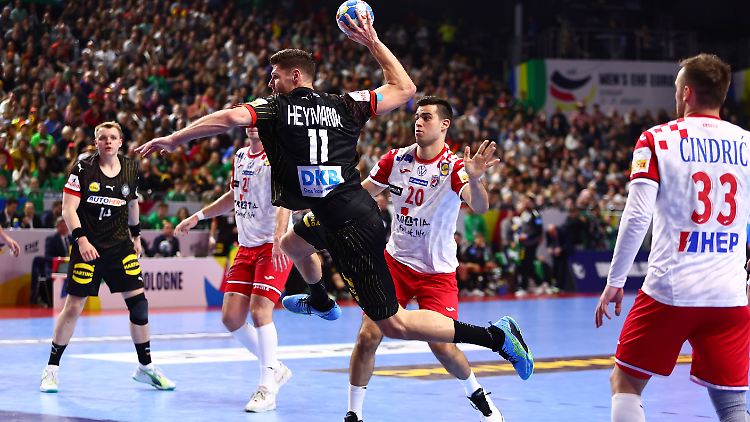The German national handball team lost a game in Cologne for the first time – and despite reaching the European Championship semi-finals, the mood was severely dampened. Good thing, at least mathematically, it was no longer a matter of anything.
What happened again in the Cologne Arena?
Rarely has a game between two major handball nations at a major tournament been as unimportant as the duel between the German national team and Croatia on the last matchday of the main round group I. Host Germany is in the semi-finals as second in the group! Croatia would finish the tournament with great disappointment anyway, finishing last in the group of six. Everything was mathematically clarified before the throw.
But of course there are no unimportant games for the German team. The host has to and wants to perform, now, with the medals in front of their eyes, the tournament is just getting started, they said. And then no one has forgotten that the hosts had a successful, but not exactly glorious start to this main round. The thriller against Iceland, the near self-destruction against Austria – it wasn’t all euphoria. It was only with the inspiring 35:28 win against Hungary that they regained the euphoria and self-image that they had left behind at the preliminary round venue.
National coach Alfred Gíslason sent the first seven onto the field at the beginning of the game, but then quickly made a lot of changes after a stuttering start. At the 2016 European Championships, that mythical triumph of the German “bad boys” who had made themselves European champions from nothing against all odds, they had hit the “wave” at some point. She carried her to the title. Against Croatia they surfed past the wave again.
It trickled along – and then they picked up: Sebastian Heymann did the Sebastian Heymann things that the national coach hoped for, that the German team needed from him: The giant sank throw after throw with a vehemence that put TÜV Rheinland in The alarm was raised to reconsider the traffic safety of the Cologne gates. Left winger Rune Dahmke also worked hard after two slight misses to repair a weak ratio. And Andreas Wolff, who only saved his first ball against Hungary after 40 minutes? After five minutes he had already made four saves. It was okay.
In the second half, the national coach sent almost his entire second suit onto the field: the four U21 world champions David Späth, Nils Lichtlein, Renars Uscins and Justus Fischer got a lot of playing time. Jannik Kohlbacher later replaced Fischer as the circle runner, and the game had long since entered the emotional equal phase again: few compelling finishes, small but expensive individual mistakes. The national coach didn’t like what he was being offered at all: “If you can’t concentrate, you have to report and get out,” he complained during a break. The Icelander didn’t change anything in terms of personnel, they were supposed to sort it out themselves – and failed. The old fear had crept back in, with weak finishes they forced Croatia’s goalkeeper Dominik Kuzmanovic to make 22 saves.
Towards the end of the game, Gíslason brought his regular staff back, but even Golla, Köster, Knorr and Co. couldn’t turn the game and the atmosphere around. It was a bitter mood dampener that the DHB team produced. “It feels extremely humbling,” said backcourt player Kai Häfner. Because every game is about something. At least not to lose sight of the wave. Without a wave, without euphoria, it is clear that the German team will suffer shipwreck in the semi-finals. World champion Denmark is its own storm in which every opponent can sink without mercy.
What happened that shouldn’t have happened under any circumstances?
The defeat? Gifted. If Germany achieves more at this European Championship than reaching the semi-finals, this game will only appear in the books and no longer in the precious metal memories. But what’s on people’s minds right now is this miserable lack of finishing. They had thought they would be driven out by storming towards the Hungarian gate and, if necessary, into the Hungarian gate.
Croatia’s strong goalkeeper Dominik Kuzmanovic made an incredible 22 saves, while German attackers failed to get nine balls onto the goal. At some point “the stupid feeling” was there again, said Philipp Weber. The feeling that dulls the senses and makes the arm heavy. Exactly the feeling you don’t need when something is at stake at the highest level.
What was going on today, Mr. European Champion?
“Today we just weren’t ready for a European Championship game, we can’t go into a game like that. That’s just annoying,” said a very annoyed Kai Häfner, who led the German team to a semi-final victory over Norway in 2016 and then to a final triumph against Spain had. “You can’t play a home game like that. We can’t present ourselves like that.”
It was a “great feeling” to have secured the semi-finals before the game, “but apparently that did something to us. Overall, we failed as a team. We all told ourselves ten times that we would be in this game have to go to win it. But we failed as a team because of that.”
The apology of the evening:
“To be honest, I’m sorry for everyone who was there today and bought tickets,” said Juri Knorr over the hall microphone on the field after the game. We’re in the semi-finals, but maybe we were too busy beforehand and switched off in our heads. That hurts me and all of us extremely.” That was “not the mentality we wanted to play with today, but we didn’t do any better.” You can’t play like that again.
What gives hope, Mr. European Champion?
“I think it’s a shame that we lost this game. But it’s not a broken neck,” said Rune Dahmke, who in 2016 shot the German team from a tight angle from the left wing in the semi-final against Norway on their way to the title in extra time . “We’re playing against two of the best goalkeepers in the world in two days, in the semi-finals at home, so if necessary you’d better just shoot them in.” And: “We have to get through the collective, the fight. I believe that we have a chance. The fans can inspire us like nothing else. Together we have already had a few good moments here. The Danes will also realize that at some point They have to be careful.” It’s also “not a bad starting point to play a European Championship semi-final at home and not have any pressure. Everyone expects Denmark to win, the pressure is entirely on them.”
Was there also some good news from a German perspective?
Yuri Knorr grinned. It was the 28th minute when the cheerful German playmaker was shown larger than life on the video cube above the center circle. Knorr had long since been replaced on the field by Philipp Weber. It was an opportunity to be amazed. What excited Knorr, a serious, strictly focused competitor on the field and a more thoughtful, reserved guy off the field, so much? It was Sebastian Heymann who scored from a long distance.
Usually and sometimes completely arbitrarily, the hall announcer announces the speed when particularly spectacular goals are scored. Not this time. It could be assumed that Heymann’s fire torch had simply overwhelmed the measuring equipment. Subsequent measurements showed the speed to be at least 1 Knorr. National coach Alfred Gíslason had already certified that his backcourt player had “probably the hardest throw of this European Championship”.
Haymann had already proven his value for the German team against Hungary – and scored four goals from four attempts with great conviction. “You can still be very important for us,” the national coach told him, he recently reported. Today it wasn’t important, so it was easy to get over the fact that Heymann also made technical errors and missed throws. He will still have his moments when it matters again. And then Juri Knorr is happy again.
Why was this game so mathematically irrelevant?
The constellation before the game was “absurd”, as DHB sports director Axel Kromer correctly described it: Due to complicated regulations, it suddenly became clear that Croatia could have harmed itself by defeating the German team. On their way to a qualifying tournament for the Olympic Games in the summer. It would be dangerous for Croatia, which is still hoping for a place in one of the tournaments, if Austria had secured a place in the semi-finals by beating Germany.
Yes, it’s complicated. And yes, it was absurd. Austria’s defeat against Iceland in the afternoon had eased the situation. The duel between Croatia and the DHB team was so mathematically irrelevant that Croatia could have won it without hesitation.
(You can go deeper into the topic here.)



